France Condemns Iran Space Rocket Launch Amid Nuclear Talks
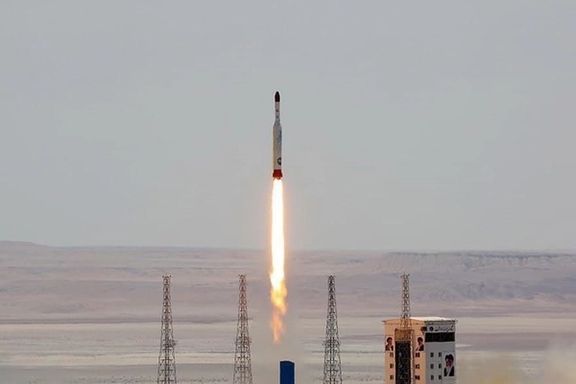
France on Friday condemned Iran's satellite rocket launch and said it was "all the more regrettable" as nuclear talks with world powers were making progress.

France on Friday condemned Iran's satellite rocket launch and said it was "all the more regrettable" as nuclear talks with world powers were making progress.
The French satement echoed concerns voiced by the United States and Germany.
Iran said on Thursday it had used a satellite launch rocket to send three research devices into space, as indirect US-Iran talks take place in Vienna to try to salvage a 2015 nuclear deal.
The satellite launch was in breach of UN Security Council resolutions, France's foreign ministry said.
"These activities are all the more regrettable as they come at a time when we are making progress in the nuclear negotiations in Vienna," the French foreign ministry said.
"We call on Iran not to launch further ballistic missiles designed to be capable of carrying nuclear weapons, including space launchers."
The US State Department said on Thursday Washington was aware of reports on the launch, adding such launches defy a UN Security Council resolution enshrining the 2015 nuclear deal.
A German diplomat said such launches could be used to test technology for ballistic missiles which in principle could be used to deliver nuclear weapons.
Tehran denies its space launch activity is a cover for ballistic missile development.

A former advisor to Iran’s Qasem Soleimani has said that a Russian officer in Syria once gave the Qods chief 100 Krasnopol guided artillery shells as a gift.
In an article published by Fars news agency, an affiliate of Iran’s Revolutionary Guards on Friday [Dec. 31], Hassan Ravandeh, related stories about the life and “charismatic” character of the slain commander as a tribute on the second anniversary of his killing.
Ravandeh, who was identified by Fars as one of the advisors to IRGC’s Qods (Quds) Force, is said to have accompanied Soleimani during his missions and trips across the region. He has recently published a book about his memoirs of the IRGC’s top man overseas.
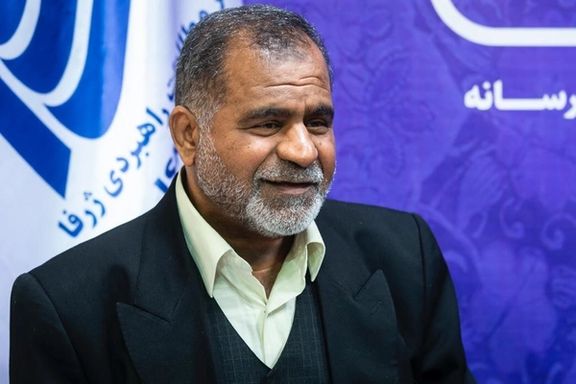
He said that Soleimani was very popular among other military men active in the region, adding that he used to bring souvenirs for the families of everybody he was involved with. He singled out an unnamed Russian commander who was stationed in the Syrian port city of Latakia that was especially fond of the Iranian commander.
According to the article, Soleimani bought a necklace for his wife and gold jewelry for his daughters before paying them a visit in Latakia. Surprised by the gifts the Russian asked how he could reciprocate the gesture, and Soleimani, reportedly, demanded that they sell him about 1,000 Krasnopol laser-guided artillery shells.
Ravandeh says that the Russian commander, who he claims is now the head of the aerospace force of the Russian army, gave Soleimani 100 projectiles because they only had 140 available in their arsenal. He added that Russia never asked for any money in return for such a gift, which according to him was worth about $7 million.

Soleimani was killed in a United States drone attack, ordered by former president Donald Trump in January 2020, as he arrived at Baghdad airport from Syria. He was Iran’s top military and intelligence operator in the Middle East, organizing proxy forces.
Soleimani played a major role in the Syrian civil war as the coordinator of Iran’s military involvement, including sending tens of thousands of regular and irregular forces to fight in support of the Syrian strongman Bashar al-Assad.
In June 2014, Iran’s Tasnim news agency in a report quoted General Mohammad Pakpour IRGC’s ground forces as saying that the Revolutionary Guard’s artillery force has upgraded its capability with deploying Krasnopol guided shells.
It is not clear if Pakpour’s announcement was related to Soleimani’s exchange of gifts with the Russian commander in Syria. Russia was still not officially involved in the Syrian war in 2014, but it most probably had a military mission to assist Assad’s forces. Russia entered the war in full force in September 2015.
It is also possible that Russia had already supplied the artillery shells before Soleimani asked for more in Syria. But whether in 2014 or later, any Russian transfer of Krasnopol shells would have violated a United Nations arms embargo on Iranimplemented in 2007, which expired in October 2020, well after Pakpour’s statement or Soleimani’s death.
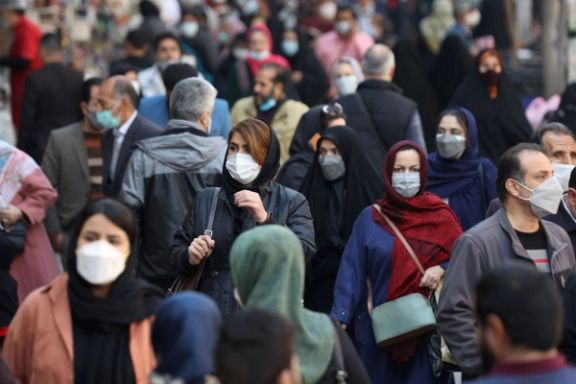
Iran's economy minister has said Thursday that the government has no immediate solution for the hardship families face, urging people to be patient.
"We have no immediate solution for the problems of families except compensation through adjusting the amount of cash handouts but there are efforts underway the results of which can be felt in a few months’ time," Ehsan Khandouzi said at a meeting with economy professors.
The cash handouts referred to amount to $3-4 dollars a month, for each person.
Khandouzi referred to a decision by President Ebrahim Raisi’s government to eliminate a scheme that since 2018 provides cheap dollars to importers of food, medicine and animal feed as a way to keep prices low. In fact, providing dollars at a rate seven times lower than the market is a subsidy meant to help ordinary people against a high, double-digit inflation rate since 2018 when the United States imposed sanctions on Iran.
Currently the street rate for one US dollar is 300,000 rials, while the subsidized dollar for food imports is 42,000 rials.
Concerns have recently been growing over the consequences of the plan which experts say will hit the lower-income families very hard as the “reform” is expected to affect the prices of staples such as bread, rice, dairy products, and protein foods severalfold.
The elimination of the subsidy is not to be implemented before late March when the budget law for the next Iranian calendar year is put into effect, but media last week reported that food prices are already rising in anticipation of the move.
The media last week reported that the price of eggs has already been affected
as production of eggs is highly reliant on chicken feed, currently imported at the subsidized exchange rate. The price of a pack of thirty eggs that sold for around 400,000 rials last week has reportedly risen to around 600,000, while municipality-run markets have also increased their price by 40,000 rials.
In US dollars, 600,000 rials is around $2 and may sound cheap, but a typical worker in Iran earns around a $100-120 a month and cannot afford meat any longer, relying on eggs as a nutritious food.
"Experts and lawmakers' remarks about the possibility of elimination of the 42,000 rial rate led to some importers to withhold chicken feed from the market," Naser Nabipour, Chairman of Egg Producers Union, told Mehr news agency Thursday.
Hardliners who constantly criticized the Rouhani administration for "neglecting people's subsistence" can no longer deny the increasing pressure on lower-income families and growing poverty that is pushing middle-income families into poverty.
"The poverty line for a family of four is at a minimum of 120 million rials a month. This means that around 70 percent of Iranians now live under the relative line of poverty," economist Morad Rahdari told Shia News Association (Shafaqna) last week. Rahdari explained that relative poverty means not being able to afford anything other than minimum essentials such as food and housing.
Rahdari blamed unemployment for the growth of poverty. According to Rahdari the real number of unemployed is 20 million, not 3 million as government statistics claim because those who work even one hour per week are considered as employed.
He also said lack of investment, resulting from sanctions, more people to fall below the poverty line in the past 12 years. "There will be crisis after crisis, lack of development, more poverty and increasing corruption if the issue of sanctions is not resolved and the country falls behind in development more than this," he warned.
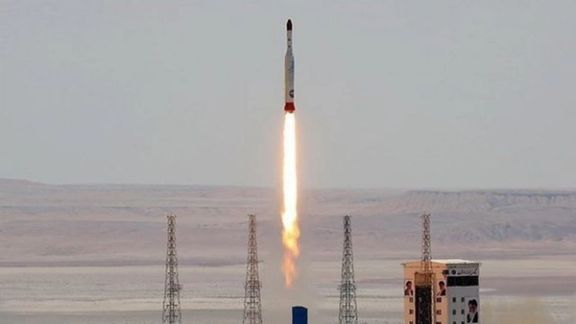
Iran vowed on Friday to launch more rockets into space before March, one day after it claimed “research payloads” were sent into low orbit around the earth.
Mehdi Farahi, deputy defense minister said Iran will use an advanced version of its Simorgh rocket, which he said has more superior technology.
Iran's annoucement Thursday of the rocket launch coincided with negotiation in Vienna over its nuclear program and could be seen as an attempt to demonstrate military prowess.
Rockets for space launch are in essence ballistic missiles that Tehran relied on as a main weapon against regional targets. Some foreign observers and governments have argued that Iran's space program is a cover for testing of ballistic missiles.
The US State Department criticized Thursday’s announcement by Iran of the rocket launch. “The United States continues to use all its nonproliferation tools to prevent the further advancement of Iran's missile programs and urges other countries to take steps to address Iran's missile development activity,” the State Department spokesman said.
Western powers have said Iran’s testing of ballistic missiles contravenes United Nations Security Council resolution 2231, which in endorsing the 2015 nuclear agreement banned Iran from “any activity related to ballistic missiles designed to be capable of delivering nuclear weapons.”
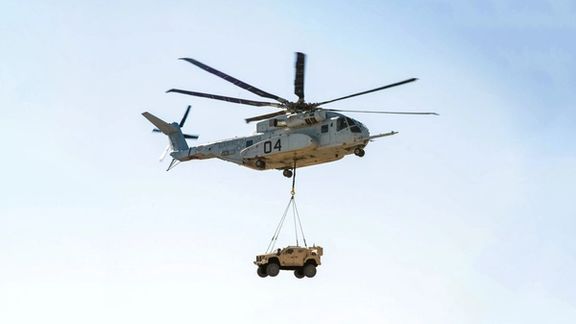
Israel has signed a deal with the United States to buy 12 Lockheed Martin CH-53K helicopters and two Boeing Co KC-46 refueling planes, the defense ministry said on Friday.
The deal amid heightened tensions with Iran is estimated to total at around $3.1 billion, according to the defense ministry.
Israel has repeatedly said in recent months that it will not hesitate to attack Iran if Tehran's nuclear program approaches a weapons' capability.
The deal, signed on Thursday, is part of an upgrade of Israel's air force capabilities and includes an option to buy six additional helicopters, a ministry statement said.
It said the first helicopters were due to arrive in Israel in 2026. Brigadier-General Shimon Tsentsiper, chief of materiel for the air force, told Israel's Army Radio on Thursday that the refueling planes on order would not be delivered before 2025.
He said Israel was trying to bring forward the delivery of the KC-46s, and eventually wanted a total of four of them.
Israeli media have speculated that the refueling planes could be crucial for carrying out a long-threatened air strike on Iran's nuclear facilities. Tsentsiper said the air force's current refueling capacities were sufficient for its missions.
With reporting by Reuters
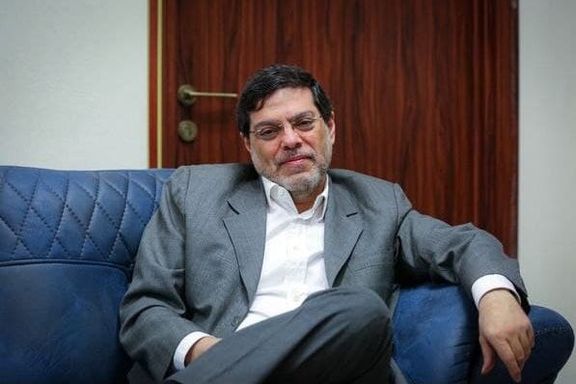
The presence of a man believed to be a United States citizen in Iran's nuclear negotiating team has led to controversy in Iranian media and on Twitter.
Social media users have criticized Mohammad Marandi, an advisor to the Iranian nuclear negotiations team in Vienna for making complacent comments about what may happen to Iran if the nuclear talks fail.
The Twitter account of reformist daily Sharq on December 28 quoted Marandi as having said: "What will happen if the UN resolutions against Iran are revived? We attach no value to the other side's ultimatums, because nothing is going to happen to us even if they pull out of the JCPOA and activate the trigger mechanism."
As part of the attacks on Marandi, Twitter users and some news websites in Iran said that Marandi is a US citizen so he should not be worried about the economic and other consequences of the JCPOA collapse.
Iranian investigative journalist and historian Hossein Dehbashi revealed on Twitter on December 25 that Marandi is a US citizen and questioned his presence in Iran’s diplomatic circle. Marandi in his response posted a picture on Twitter saying it shows him in Basij militia uniform when he was 16. He also said later that he was born in the United States, but he is not a US citizen or a green card holder. Dehbashi asked how come he can pay frequent visits to the United States.
Meanwhile, no one mentioned that if Marandi was born in the United States, then he is automatically a citizen.
According to Rouydad24 news website in Tehran, Mohammad Marandi was born in the US 1966. He is the son of Alireza Marandi who is Supreme Leader Ali Khamenei's family doctor. When he first came to Iran after his father was appointed Health Minister, Mohammad was only 13.
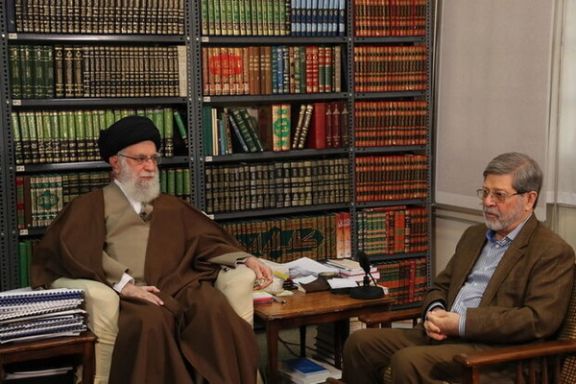
Mohammad Marandi has said that he did not speak Farsi when he came to Iran and he had a hard time at the Alavi High school, where most Iranian hardliners studied. This raises the question that his mother was not from Iran, but there is no public information about her. The headmaster of that school was Khamenei's Foreign Policy Chief Kamal Kharrazi who later became Iran's Foreign Minister under President Mohammad Khatami (1997-2005).
Mohammad Marandi also accompanied former Foreign Minister Javad Zarif's team during the nuclear negotiations from 2013 to 2015 although he was not part of the team. Zarif has officially praised him for his services as a liaison with Western media. In those years, Marandi appeared frequently on Iran's Press TV as well as on major US networks defending Tehran's hardliners.
According to Rouydad24 he also played a part in the negotiations by inviting some US public diplomacy players to Iran. Wat they did in Iran is not known. The hardline daily Kayhan at the time charged that Marandi's World Studies Center "secretly brought US public diplomacy officials to Iran." The daily called the center "an office similar to a branch of the Iranian Foreign Ministry."
Marandi was the dean of Tehran University's World Studies Center. Some call it the Faculty of World Studies. However, academics in Tehran say the center no longer exists. That could explain Marandi's official title as "Former head of the university's World Studies Center."
According to Rouydad24, Mohammad Marandi is a US citizen. The website has quoted him as saying that when living in an affluent neighborhood in Ohio he was subjected to racism as he was not considered "white."
Marandi has told US media that he is a big fan of the NFL and supported the Dallas Cowboys when he was in America.
Under President Ahmadinejad, Marandi used to explain the populist ultraconservative President's ideas on major US channels and often claimed that Ahmadinejad's controversial statements were not properly translated into English.
According to Rouydad24, during his TV appearances, Marandi proved to have access to confidential information in cases such as the seizure of foreign oil tankers by Iranian forces.
The website questioned Iranian officials’ double standard about dual nationals, and quoted Dehbashi as saying, "In the previous government being a dual national was considered a bad thing but now no one protests to a US citizen's placement in the nuclear negotiations team." Marandi has subsequently "blocked" Dehbashi and others who asked questions about his US citizenship and US passport, and only answered that he does not have a social security number in the United States.
According to Rouydad 24, Marandi repeatedly introduced himself as a US citizen in an interview with US Guernica Magazine in 2008. "As a child, I used to feel much more American than Iranian. Like everyone else at school, I pledged allegiance to the flag. However, after returning to Iran, sadly, I learned about a very different America, an America that most Americans have no idea exists. For the first couple of years this was hard to accept, and it was really painful in some ways."